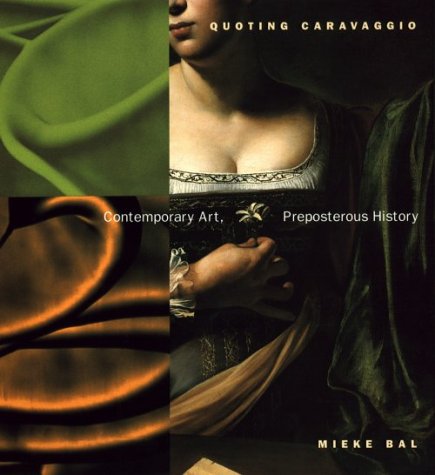Quoting Caravaggio
Contemporary Art, Preposterous History
Mieke Bal
BOOK REVIEW

In Quoting Caravaggio: Contemporary Art, Preposterous History, Mieke Bal crafts a provocative tapestry that threads the past with the present, inviting you to not merely observe but to confront the vast chasm between history and its incessant interpretations. Bal's incisive analysis of Caravaggio-a historical figure steeped in controversy and brilliance-shakes the very foundations of art criticism and history. 🌪
Here lies the brilliance of Bal's exploration: she refuses to let Caravaggio be just a relic of the past. Instead, she resurrects him, weaving him into the complexities of contemporary art and thought. This is not merely a discourse on aesthetics; it's an emotional expedition into how art functions as a medium of power, identity, and cultural memory. As you navigate this terrain, Bal compels you to engage with the notion that history is not a straightforward recounting of events but a "preposterous" tapestry of narratives that we continuously rewrite, often in the image of our own biases and worldviews.
But it's Bal's embrace of the radical that truly resonates. Her arguments are neither polite nor couched in academic nicety. Each assertion is a jolt that shakes the reader from complacency. She enacts a rebellion against the dogma that art is purely an aesthetic experience. Instead, through Caravaggio's life and art-the chiaroscuro of human experience-she illuminates the intricate dance between artistry and social commentary. This isn't just a book; it's a clarion call to recognize the political and ideological implications embedded within art. Artists become historians, as Bal illustrates how they challenge the narratives of their times.
Readers' reactions to this text range from admiration for its intellectual rigor to criticism for its sometimes, shall we say, dense prose. Some argue that Bal's arguments require diligence to unpack, while others are enraptured by her bold declarations that disrupt conventional thinking. It's precisely this tension-the push and pull of accessibility versus profundity-that makes Quoting Caravaggio a work that lingers in the mind long after the final page has been turned.
To many, Bal's work represents a cathartic examination of how society pigeonholes both history and art into digestible morsels, often missing the chaos and the messiness that drive humanity forward. The echoes of Caravaggio's dramatic narratives compel you to reflect: What stories have been conveniently forgotten? What voices silenced? Bal urges you to confront the uncomfortable questions, to seek out the preposterous histories that challenge your worldview. The historical is personal, the personal is political, and art-ah, art transforms these tangled webs into something visceral that speaks directly to the heart. ❤️
Whether you're a seasoned academic or a curious reader, the urgency that pulses through this text is intoxicating. You may find yourself re-evaluating the very fabric of cultural narratives you once accepted as gospel. Quoting Caravaggio is a manifesto for those ready to explore the audacity of art and its role in shaping history-and perhaps, in shaping you. The challenge lies before you: to engage, to question, to burst forth into a realm where history isn't merely quoted but quarried for its deeper truths. Don't miss this opportunity to redefine your understanding of art through Bal's groundbreaking lens!
📖 Quoting Caravaggio: Contemporary Art, Preposterous History
✍ by Mieke Bal
🧾 328 pages
1999
#quoting #caravaggio #contemporary #art #preposterous #history #mieke #MiekeBal